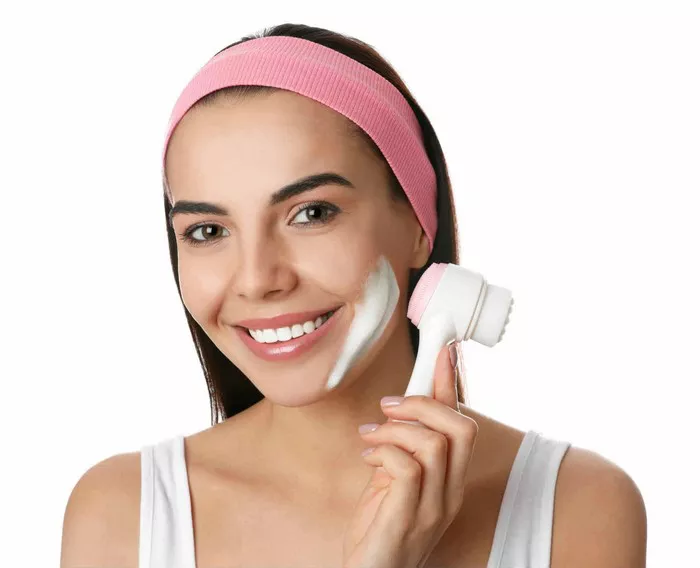Facial brushes have gained significant popularity in skincare routines, promising deep cleansing, exfoliation, and overall skin rejuvenation. However, the question remains: are facial brushes truly beneficial for your face? In this comprehensive guide, we will delve into the effectiveness, potential benefits, drawbacks, and considerations associated with incorporating facial brushes into your skincare regimen.
Understanding Facial Brushes
Facial brushes are handheld devices equipped with bristles, typically made of synthetic fibers or silicone, designed to cleanse and exfoliate the skin. They come in various shapes, sizes, and functionalities, including manual brushes and electric-powered devices with oscillating or rotating heads. These brushes are intended to remove impurities, excess oil, makeup residue, and dead skin cells, promoting a smoother, brighter complexion.
The Benefits of Facial Brushes
1. Deep Cleansing: Facial brushes can penetrate deep into the pores, effectively removing dirt, oil, and other impurities that traditional cleansing methods might miss. This deep cleansing action helps prevent clogged pores, acne breakouts, and dullness, leading to clearer and healthier-looking skin.
2. Exfoliation: The bristles of facial brushes aid in gentle exfoliation, sloughing off dead skin cells to reveal fresher skin underneath. Regular exfoliation can improve skin texture, promote cell turnover, and enhance the absorption of skincare products, allowing them to penetrate more deeply into the skin.
3. Stimulated Circulation: The massaging action of facial brushes can stimulate blood circulation in the skin, promoting a natural glow and a more youthful appearance. Improved circulation delivers oxygen and nutrients to the skin cells, aiding in their regeneration and overall vitality.
4. Enhanced Product Absorption: By removing barriers such as dead skin cells and excess oil, facial brushes can optimize the absorption of skincare products, including serums, moisturizers, and treatments. This maximizes the efficacy of these products, leading to better results in addressing specific skin concerns.
Considerations Before Using Facial Brushes
1. Skin Sensitivity: While facial brushes offer numerous benefits, they may not be suitable for everyone, especially those with sensitive or easily irritated skin. The bristles and exfoliating action of the brush could potentially exacerbate sensitivity, leading to redness, inflammation, or even damage to the skin barrier.
2. Frequency of Use: It’s essential to consider how often you should use a facial brush. Over-exfoliation can disrupt the skin’s natural balance, leading to irritation, dryness, and increased sensitivity. Experts typically recommend using a facial brush no more than two to three times per week, adjusting the frequency based on individual skin tolerance.
3. Hygiene: Proper maintenance and cleaning of facial brushes are crucial to prevent bacterial buildup and contamination. Regularly sanitize the brush head and allow it to dry completely between uses to minimize the risk of introducing bacteria to the skin.
Conclusion
Facial brushes can be valuable additions to your skincare routine, offering deep cleansing, exfoliation, and enhanced product absorption. However, it’s essential to approach their use with caution, considering factors such as skin sensitivity, frequency of use, and hygiene practices. Consulting with a dermatologist or skincare professional can help determine if facial brushes are suitable for your skin type and address any concerns or questions you may have.
FAQs
Q1. Are facial brushes suitable for all skin types?
A1: Facial brushes can benefit various skin types, but individuals with sensitive or easily irritated skin should exercise caution. Opt for softer bristles and gentle brushing motions to minimize the risk of irritation. If you have specific skin concerns or conditions, such as rosacea or eczema, consult with a dermatologist before incorporating a facial brush into your routine.
Q2. Can facial brushes help with acne-prone skin?
A2: Facial brushes can be effective for acne-prone skin by helping to unclog pores and remove excess oil and impurities. However, it’s crucial to use them with care to avoid exacerbating acne or causing inflammation. Choose a brush with soft bristles and avoid applying excessive pressure during use. Additionally, be mindful of the products you use alongside the brush, opting for non-comedogenic formulas that won’t further congest the pores.
Q3. How should I clean and maintain my facial brush?
A3: To maintain hygiene and prolong the lifespan of your facial brush, clean it thoroughly after each use. Rinse the brush head with warm water and mild soap, ensuring all traces of cleanser, makeup, and debris are removed. Allow the brush to air dry completely before storing it in a clean, dry place. Additionally, sanitize the brush head regularly using a gentle disinfectant solution or alcohol-based spray to prevent bacterial buildup.

